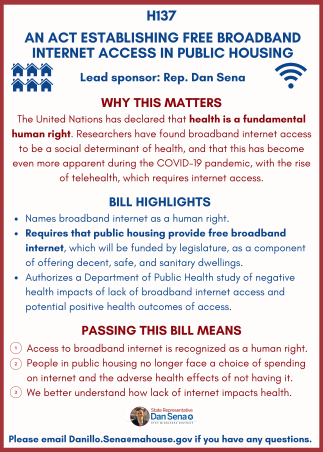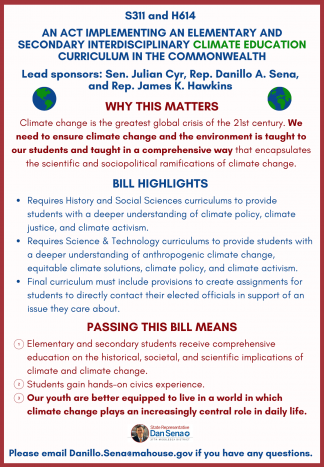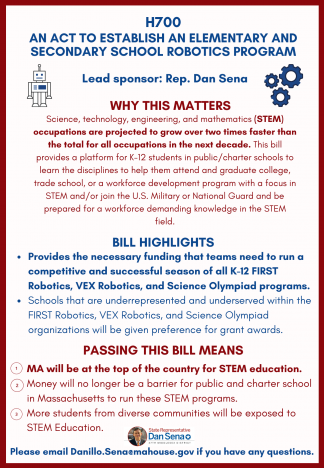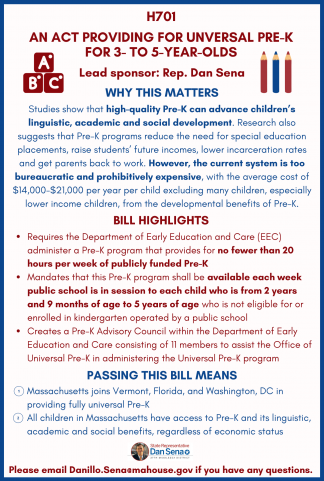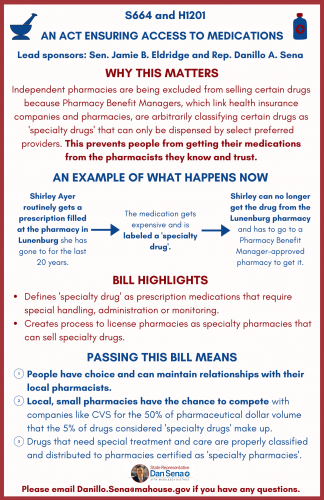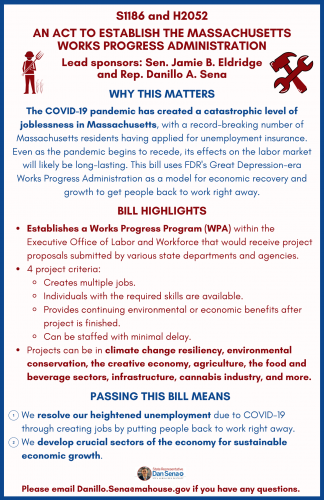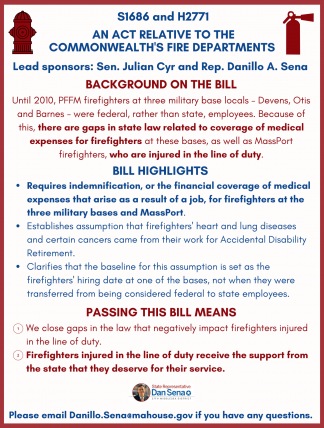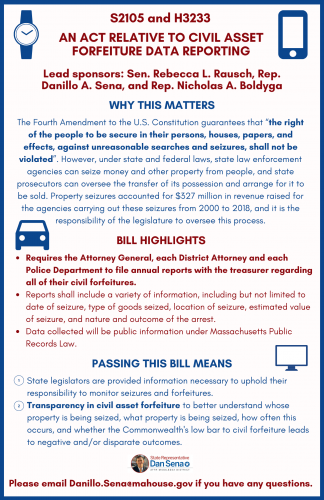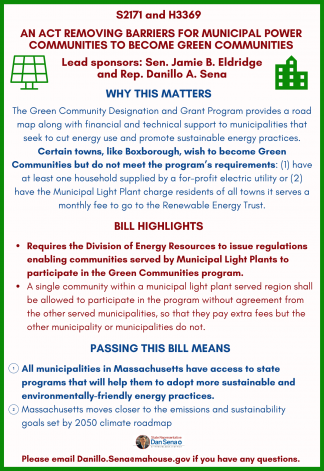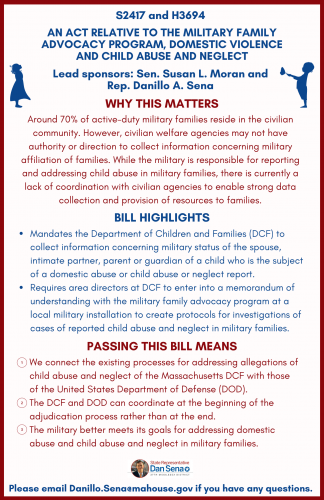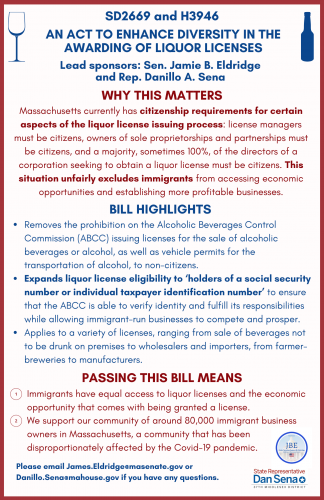I filed this bill following discussions I had with local Human Services workers. They pointed to major gaps in internet availability and accessibility in the commonwealth that negatively affect the clients they serve, as well as recent research by Benda et al (2020) that names internet access as a social determinant of health. We drafted H137 together to reflect the need to expand broadband internet to all people in the Commonwealth. This bill will also help us better understand both the negative outcomes associated with lack of access to internet and the positive outcomes associated with access.
Climate change is the global crisis of the 21st century. Our children need to receive a quality education on climate because this is an issue that will play a central role in their lives, and in the lives of their children. Climate Action’s importance to the 37th Middlesex District is reflected in it being one of the top issues that constituents have contacted me about, with a vast majority taking pro-climate action stances. I believe this bill fits in well with the priorities of the people I have been elected to represent, and view it as one crucial piece of a larger Climate Action agenda. I also want to mention that this bill was written by students, for students, so it reflects the needs of students as they perceive them.
Until recently, I knew little about school robotics programs. This changed when my intern Olivia, a member of Ayer-Shirley’s robotics team, FRC Andromeda 4905, brought up robotics in conversation. She shared with me the profound impact that robotics has had on her and her teammates. She also expressed a desire to ensure that all students have the same access to this experience. Following this conversation, we decided to draft this bill to create a program to provide the state funding needed to enable schools all over Massachusetts to establish and develop robotics programs for their students. Robotics programs give students an opportunity to build hard skills such as coding and robot building, and soft skills like teamwork, flexibility, and leadership. They also give students a community in which everyone can feel at home. It is clear from the many students I have talked with that robotics programs are transformative, which is why I am so proud to have introduced this bill to support such excellent educational opportunities in STEM.
As a parent of now 3 young children, I have experienced firsthand the exclusionary barriers inherent in our current Early Childhood Education and Care system. It is too bureaucratic and prohibitively expensive. The average annual cost of $14,000 to $21,000 per year for Pre-K for just one child is a significant portion of the Massachusetts median income. When you add it on to housing, food, technology, and all the other expenses people have, for many this is simply too much. I know my family is far from the only family to face the hurdles of cost and bureaucracy. In writing this bill, my goal was straightforward: to help children across the Commonwealth access quality Pre-K.
Small pharmacies should be able to complete on level ground with CVS and Walgreens, and people should be able to maintain their relationships with trusted, local small pharmacies for as long as they would like. I believe both of these statements are true, and that’s why I filed this bill. Right now, because of how our system is set up, the go-betweens for health insurance companies and pharmacies can effectively stop small pharmacies from selling drugs once they get expensive by labeling them ‘specialty drugs’. This locks small phamacies out from huge shares of the market. It also means that someone could go to their local pharmacy for 20 years to get a daily medicine, have the medicine named a ‘specialty drug’, and then need to switch over to an ‘approved’ pharmacy, which is inevitably a big, corporate pharmacy. This bill rights these wrongs and helps local small pharmacy businesses and the people who give them their business.
This is the very first bill I filed, along with Sen. Jamie Eldridge, soon after I became a State Representative last June. It is as clear to me now as it was then that as we rebuild our economy in the wake of the COVID-19 pandemic, we need government to take an active role in this rebuilding. Just as Franklin Delano Roosevelt’s New Deal brought our country back from the Great Depression by creating huge amounts of jobs through programs like the Works Progress Administration, we can build back better by establishing a Massachusetts Works Progress Administration to fill that same role. In doing so, we will not only create jobs, but put people to work on critical projects to develop infrastructure across a variety of sectors that will make our state’s economy more robust and our lives better.
When our firefighters rush into danger and save lives, and as a result suffer health consequences, it is unconscionable that we do not have their backs in every single case. This bill to close gaps in current state law concerning the indemnification of firefighter medical expenses will make a small but significant change to the law so that firefighters at three military base locals and for MassPort are not left out of health care coverage due to what is basically a technicality. Supporting all of our firefighters – it’s just the right thing to do.
As State Representative, one of the most important things to me is making sure that people’s civil rights are being respected. That’s why Rep. Nicholas Boldyga and I filed H3233, bipartisan legislation that would create transparency in the civil forfeiture process. Right now, it’s easy for law enforcement to seize people’s property, hard for people to win their property back, and we have little reporting or data to understand the breadth of civil forfeiture in Massachusetts. This bill would shed light on a process that raises fourth amendment concerns and help us better understand whether further reform at the state level is needed.
Like I mentioned earlier, Climate Action is one of the main issues I have been contacted on by constituents while in office. I know that the residents of the 37th Middlesex District care deeply about our environment. The Green Communities Designation and Grant Program is an excellent state program that has provided grants, technical assistance, and local support to help around 300 of Massachusetts’ 351 cities and towns to make strides in energy efficiency and clean energy use. However, for technical reasons, a number of towns have been excluded from the program. One of the excluded towns is Boxborough, located in our district. The town and its residents want to contribute to our statewide effort to conserve energy and be more sustainable, but are being held back by a technicality that requires a legislative solution, which this bill provides.
As State Representative for Devens, I represent a large military community centered around Fort Devens RFTA. For that reason it is especially important to me that I work in the legislature to support service members and their families. I filed this bill because I want to make sure the military can engage with and help all soldiers and their families in Devens and across the Commonwealth on the issue of child abuse and neglect.
I am the first Brazilian immigrant elected to a state legislature in the United States. This means I have a close connection with the Brazilian community, and with the larger immigrant community. One of the issues that has been brought to my attention by members of these communities is that there are citizenship requirements for some parts of liquor licensing. This means that certain positions in businesses that want to get a liquor license can only be filled by U.S. citizens, which is unfair to and disadvantages immigrant-owned small businesses that want to get a liquor license. With this bill, we will support the immigrant community’s economic prosperity and ensure more equal access to business opportunities for the Commonwealth’s immigrants.

